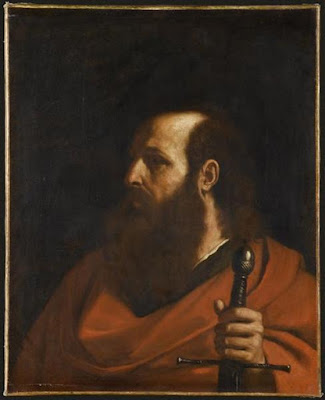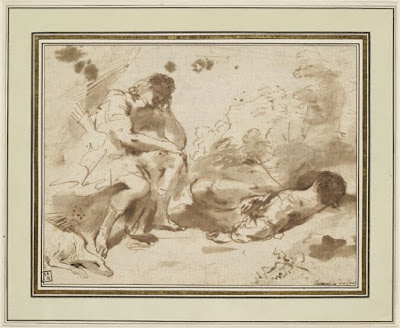 |
| Guercino (Giovanni Francesco Barbieri) Lucretia 1644 oil on canvas UniCredit, Bologna |
 |
| Guercino (Giovanni Francesco Barbieri) Lucretia 1644 drawing (hand study) Staatsgalerie, Stuttgart |
 |
| Guercino (Giovanni Francesco Barbieri) St Philip Neri 1644 oil on canvas (in ruinous condition) Chiesa Nuova, Rome |
 |
| Arnold van Westerhout after Guercino St Philip Neri 1703 engraving Biblioteca Casanatense, Rome |
 |
| Guercino (Giovanni Francesco Barbieri) St Paul 1644 oil on canvas Musée du Louvre |
"[Carlo Cesare] Malvasia recorded this head-and-shoulders of St Paul under 1644 as commissioned by 'Comendatore Luigi Manzini Bolognese'. Luigi Manzini (1604-57), a scholar and acquaintance of Guercino, was the younger brother of Giovanni Battista Manzini (1599-1664), the actual patron (and the only brother to bear the title of Commendatore), who paid 40 scudi for the picture on 12 March 1644. Commendatore Manzini's pictures, including the St Paul, were offered to Francesco I d'Este, Duke of Modena, in 1647, and again in 1651. On the second occasion the Duke seems to have bought them en bloc. The St Paul was one of a large group of pictures taken by the French from the Palazzo Ducale in 1796 and subsequently exhibited in Paris. Like many others taken from Italy, they were never returned, despite the restitution treaty of 1815."
 |
| Guercino (Giovanni Francesco Barbieri) St Helen discovering the True Cross 1644 oil on canvas Chiesa di San Lazzaro dei Mendicanti, Venice |
 |
| Guercino (Giovanni Francesco Barbieri) St Helen discovering the True Cross 1644 drawing (figure study) Fondation Custodia, Paris |
"A payment of 500 ducats (625 scudi) from 'li S.S. Tasca di Venezia' for this altarpiece is recorded in the account book on 5 March 1644. . . . The Tasca were a distinguished family of merchants, originally from Bergamo, based mainly in the S. Marco area of Venice. . . . Unfortunately, over the centuries the canvas has suffered considerably from damp, and the damage has been compounded by inexpert retouching."
 |
| Guercino (Giovanni Francesco Barbieri) Cephalus and Procris (lost painting) 1644 oil on canvas formerly Gemäldegalerie, Dresden |
"The picture, destroyed during the Second World War, was commissioned in 1644, according to Malvasia, by Marchese Cornelio Bentivoglio, 'per mandare a donare alla . . . Regina di Francia'. . . . Soon after taking delivery of the picture, Anne of Austria, Queen Consort of France, gave it to her minister, Cardinal Mazarin, in whose inventories of 1653 and 1661 it appears. . . . The picture's subject is Cephalus's grief after mistakenly killing his wife, Procris. . . . In his agony, Cephalus crosses his legs and wrings his hands together in much the same attitude, but in reverse, as does Christ in the Mocking of Christ [directly below], the frontispiece to Dürer's Large Passion woodcut series. As for the dead Procris, with her body propped up against a stony ledge, there is more than a distinct resemblance to the nymph asleep . . . at the lower right of Titian's Bacchanal of the Andrians [also below] of c. 1519-20 in the Prado, Madrid."
 |
| Albrecht Dürer Mocking of Christ 1511 woodcut National Gallery of Victoria, Melbourne |
 |
| Titian Bacchanal of the Andrians ca. 1519-20 oil on canvas Museo del Prado, Madrid |
 |
| Guercino (Giovanni Francesco Barbieri) Cephalus and Procris 1644 drawing (compositional study) Princeton University Art Museum |
 |
| Guercino (Giovanni Francesco Barbieri) Cephalus and Procris 1644 drawing (compositional study) Chrysler Museum of Art, Norfolk, Virginia |
 |
| Guercino (Giovanni Francesco Barbieri) Cephalus and Procris 1644 drawing (compositional study) Royal Library, Windsor |
 |
| Guercino (Giovanni Francesco Barbieri) Cephalus and Procris 1644 drawing (compositional study) Ashmolean Museum, Oxford |
 |
| Louis-Simon Lempereur after Guercino Cephalus and Procris ca. 1750 engraving Gemäldegalerie, Dresden |
– quoted texts from The Paintings of Guercino: a revised and expanded catalogue raisonné by Nicholas Turner (Rome: Ugo Bozzi Editore, 2017)